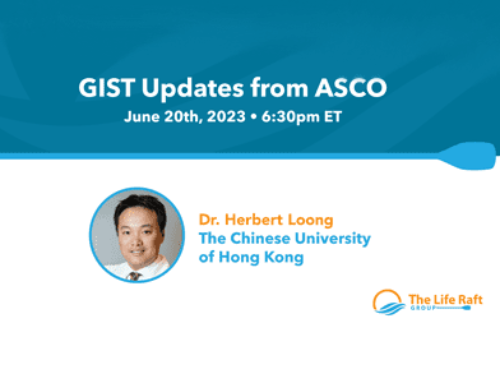Executive Director, Norman Scherzer, and Real World Evidence Data Scientist, Dr. Yu Wang, of the Life Raft Group recently attended the ASCO (American Society of Clinical Oncologists) 2018 meeting in Chicago. Dr. Wang describes some of the studies most relevant to GIST.
Clinical trials
The phase Ib SURE trial from the Vall d’Hebron University Hospital Institute of Oncology is based on the fact that the fixed combination of sunitinib and regorafenib is too toxic and GISTs in the cell cycle need time to recover. This SURE trial is designed to rapidly alternate sunitinib (37.5mg for 3 days) and regorafenib (120mg/160mg for 4 days) intake within each week for 28 days for patients with imatinib-resistant GIST. Among the 14 patients within this trial, one hypertension and two hand-foot syndrome cases were observed. Of the 13 patients with evaluable CT scans, stable disease (SD) was the best response observed in 4 patients by RECIST. This study indicated that rapid alternation of drugs with complementary activity is a well-tolerated treatment strategy.
http://abstracts.asco.org/214/AbstView_214_220895.html
There is no effective treatment for SDH-deficient GIST. Dr. Jaydira Del Rivero from the NIH reported their ongoing phase II study using guadecitabine in three groups of patients: SDH-deficient GIST, SDH-deficient PHEO/PGL and HLRCC-associated renal cell carcinoma. Guadecitabine is a small molecule that acts as a DNA methyltransferase inhibitor. In this trial, adults and children received guadecitabine subcutaneously at a dose of 45mg/m2/day for 5 consecutive days on a 28-day cycle. Initially 7 evaluable patients in each group will be enrolled and if 1 or more have a response, accrual will continue until a total of 21 patients have enrolled.
http://abstracts.asco.org/214/AbstView_214_217479.html
Dr. Suzanne George of Dana Farber Cancer Institute presented their findings of mutational profiles from the phase I DCC-2618 trial (Deciphera). DCC-2618 is a type III pan-KIT inhibitor targeting a different KIT domain compared to that of imatinib, sunitinib, or regorafinib. DCC-2618 has demonstrated durable disease control in heavily pre-treated GIST patients in the ongoing Phase 1 study (NCT02571036). The majority of patients in this Phase I trial showed tumor shrinkage and durable progression-free survival. 132 patients had a ctDNA sample available for mutation test via next-generation sequencing. activating mutations in KIT or PDGFRα were identified in 71% of patients. Among GIST patients with KIT mutant, exon 13/14 mutations were detected in 16 patients (30%); while exon 17/18 mutations were detected in 33 patients (62%). multiple patients had mutations in both exons 13/14 and 17/18. The mutation profile of GIST suggests the need for a pan-KIT inhibitor across various lines of therapy. Indeed, DCC-2618 is being tested in a randomized phase III study (INVICTUS) for the 4th+ line population, with plans to be tested in another Phase III study in 2nd line GIST soon.
http://abstracts.asco.org/214/AbstView_214_225131.html
Regorafenib in the standard dosing schedule (160 mg po per day for 3 weeks followed by 1week rest) was proven effective in the GRID trial in refractory GIST. However, it frequently requires dose reduction and progression of GIST tumors during the off-treatment period was also noted in some patients Dr. Yoon-Koo Kang from Asan Medical Center, Seoul, Korea reported their phase II trial to evaluate the efficacy and safety of regorafenib in lower dose. A total of 25 patients with metastatic GIST who failed imatinib and sunitinib were enrolled to receive Regorafenib for 12 weeks (100mg/day) continuously without rest. The best response was partial response in 2 (8%), stable disease in 16 (64%), and progression in 6 (24%) patient. With an 8.6 month follow-up , the median PFS was 7.3 months and the median OS was not reached with 1-year survival rate of 64.5%. Treatment was well tolerated. With comparable efficacy and better safety profile compared to standard intermittent dosing schedule, regorafenib in this trial with a lower dose continuous schedule might be an alternative treatment in GIST pts after failure of imatinib and sunitinib. http://abstracts.asco.org/214/AbstView_214_222583.html
Dr. Andrew Wagner of Dana Farber Cancer Institute presented the results of a Phase I study of the investigational Plexxikon drug PLX9486, alone and in combination with another Plexxikon agent, pexidartinib (PLX3397), or sunitinib, in patients with advanced or unresectable GIST and non-GIST solid tumors with KIT mutations. Both combinations were designed to address a broad spectrum of mutations: primary mutations at KIT exons 9 or 11 and secondary mutations at exon 13/14 and exon 17/18. The drug was generally well-tolerated and exhibited evidence of activity against resistant GIST.
http://abstracts.asco.org/214/AbstView_214_215835.html
Immunotherapy
There is no FDA-approved immunotherapy for GIST and there are few preclinical studies investigating the immunological profile in GIST. Dr. Maria Pantaleo from University of Bologna, Bologna, analyzed gene expression profiles in 18 fresh frozen GIST tumors to estimate the presence of immune cells in these tumor’s microenvironment. All GIST samples showed significant immune cell presence, especially with macrophages and T cells. Compared to other solid tumors, the immune profile of GIST appears similar to that of melanoma, which has very good response to immunotherapies.
http://ascopubs.org/doi/abs/10.1200/JCO.2018.36.15_suppl.11534
In another related poster, Dr. Armelle Dufresne from Centre Léon-Bérard, Lyon, France presented their findings of the immunologic landscape in sarcoma, including in 60 GIST tumors. This study revealed that NK cells had a strong role in GIST prognosis. This evidence supports a rationale for a future immunotherapy approach in combination with TK inhibitors in GIST. http://abstracts.asco.org/214/AbstView_214_226621.html
In addition, Jerry Call of the Life Raft Group collaborated with Dr. Michael C. Heinrich of Oregon Health & Science University on an abstract, “Overall survival in advanced GIST over time and correlation with access to post-imatinib tyrosine kinase inhibitors: Results for the Life Raft Group Registry.”
In this study, the impact of sunitinib and regorafenib in 2nd and 3rd line treatment on overall survival was explored with data from the LRG registry. The conclusion was that overall survival for advanced GIST patients in the LRG registry has improved over time. In this analysis, sunitinib and regorafenib significantly improved OS compared with control patients in the registry. The data also supports the hypothesis that the use of KIT/PDGFRA inhibitors including non-approved agents has improved OS for patients with imatinib and sunitinib resistant GIST.
http://abstracts.asco.org/214/AbstView_214_220363.html
Further findings will be published shortly.
As with all studies still in process, the final impact these trials will have on patients is yet to be determined. Many of these have the potential for positive and meaningful results, so we will continue to watch for updates and be sure to report on them as we hear any new information. This is particularly true for the immunotherapy studies, as that has been a very hot topic in cancer research for the last few years and has now begun to filter down in earnest to GIST studies. Also worth mentioning is that a number of the clinical trials listed above are still ongoing – patients who are interested in participating in these trials are encouraged to look at our Clinical Trials Database (https://gisttrials.org/) where they can see these trials (as well as a number of others), check eligibility requirements, and see a list of sites for each trial.
Additional commentary was recently shared by Nancy Berezin of GIST Support International and this excerpt is reprinted here with permission:
Blueprint Medicines’ BLU-285 now has a name — avapritinib — and is on track for NDA filing in the first half of 2019 for GIST patients with the hard-to-treat PDGFRA D842V mutation. Enrollment in the Phase I “NAVIGATOR” study is complete in this population, but there are slots remaining for other patients with KIT- or PDGRFA-mutated GIST who have progressed on imatinib. Meanwhile, Blueprint’s randomized Phase III “VOYAGER” trial is about to begin enrollment. It is designed to test the safety and clinical activity of avapritinib vs regorafenib and is open to patients with advanced GIST who have progressed on imatinib and up to two other TKIs. The safety profile of this drug is similar to that of imatinib, with patients typically encountering gastrointestinal effects, periorbital edema, etc. Hand-foot syndrome has not been observed. However, up to 30% of study patients have experienced dose-dependent cognitive symptoms — mostly Grade 1 or 2 — which the company is following closely. Blueprint is also getting ready to roll out an educational campaign for both physicians and patients highlighting the importance of mutational testing as a prelude to targeted GIST therapy.
Another investigational drug that targets the PDGFRA D842V mutation is AROG’s crenolanib. Because it is so narrowly focused (crenolanib does not have activity against VEGFR, FGFR, or KIT), accrual into the randomized, placebo-controlled trial (ARO-012) has been slow, with approximately 20 patients enrolled thus far at sites in the U.S. and Europe. Patients must demonstrate advancing or metastatic GIST, but can have prior exposure to any of the TKIs.
A useful study by a French group led by Dr. Olivier Mir examined the impact of proton pump inhibitors (PPIs) on sunitinib pharmacokinetics and activity. It already had been suspected that intake of PPIs might interfere with TKI bioavailability, and this proved to be the case: the amount of sunitinib dosage that actually was absorbed decreased by about 40% when PPIs were administered simultaneously. The authors concluded that either PPI discontinuation or sunitinib dose escalation should be considered in this setting.
Click here for further abstracts concerning GIST at ASCO 2018



